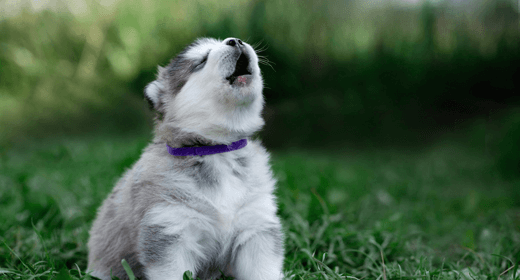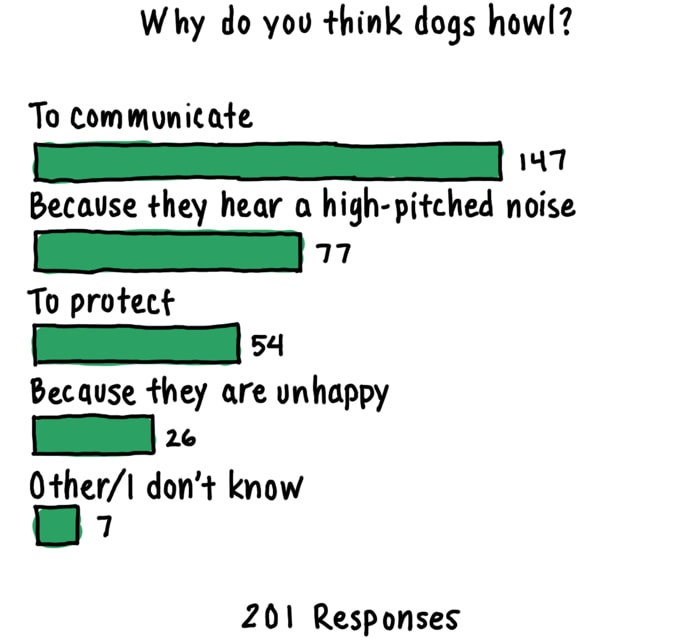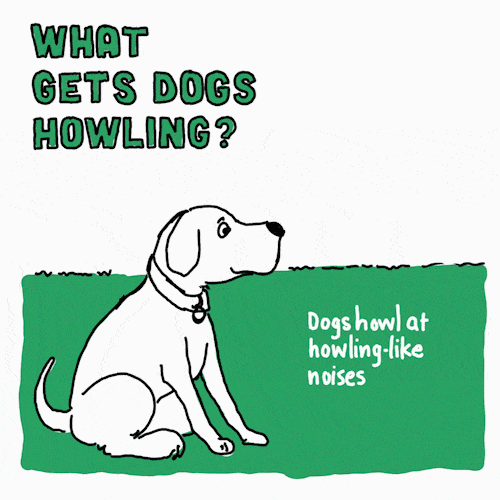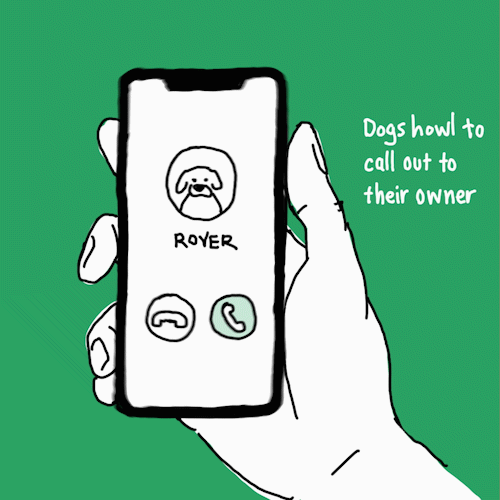

Every pet parent wants to know the meaning of dog howling. Now, we all know what howling sounds like - it’s a high-pitched sound that sounds like a doleful cry. However, many of us are still quite unaware of why do dogs howl. Well, here’s a fun fact: howling for dogs is genetic inheritance. It’s no news that dogs are closely related to wolves. Despite the difference in their sizes, wolves and dogs share around 99% DNA. However, heredity is not the only reason why dogs howl. So, what does it mean when a dog howls, and how can you handle your howling dog? You will find answers to such questions in this article.
To handle a howling dog, you first need to understand the reason why your pet is making this long, wailing noise. Here’s a look at some probable causes of dog howling.
Dogs feel stimulated by high-pitched sounds. Howling is their way of responding to fireworks, sirens, bells, and other noises. This type of howling starts as soon as they hear the shrill sound. As a pet owner, you don’t have to worry about this type of howling since it usually stops when the trigger sound does.
If a dog is excessively attached to you, they might experience separation anxiety. So, once your little companion learns that you won’t be around for a few days, they might start howling under stress and anxiety. If your dog howls every time you need to leave for a long period, it is a sign of hyper-attachment. You might have to treat their anxiety to manage this type of howling. And no, scolding them is not the right way of doing it.
A howling dog could also be seeking attention. And this type of dog howling can be bothersome. You might feel like scolding, questioning, or holding your furball, but you must do the exact opposite of it. Avoid giving your pet any type of attention. Don’t pamper or scold them.
Dogs can sense bad weather, earthquakes, diseases, and so much more. Hence, you cannot rule out the fact that a howling dog could also be trying to alert you of something. Maybe they feel a situation is not right for you or could cause you potential harm. Dogs can sense the intentions of a person through their facial expressions. That’s exactly why dogs howl at some people who try to get near you or your house.
Dogs are still very social animals; it’s just that now we are their pack. When they miss us, they will howl in hopes we respond. Dr. James Serpell, BSc, Ph.D., Professor of Humane Ethics & Animal Welfare at the University of Pennsylvania School of Veterinary Medicine, explains it this way: That [howling] is an attempt on the part of the dog to ask the owner, ‘Where are you so that I can rejoin you?’
Dr. James Serpell doesn’t believe so. “My own research has shown that it is common across breeds. People think huskies may be more prone to group howling.”
Dogs going through separation anxiety may howl excessively when left home alone. Dr. Jo Gale, BVetMed CertLAS MRCVS, Senior Manager for Global Science Advocacy at Waltham Petcare Science Institute, says, “If you reinforce quiet behavior, they are less likely to continue howling.” You can do this by quieting your dog and then leaving for a very brief time before returning and rewarding them when they stay quiet. Gradually increase the time you’re gone to reassure them you’ll always be back.
But what if your pawsome pet is howling due to other reasons? Let’s understand how to handle such situations:
As a pet parent, you must avoid reacting to the howling. This could encourage your dog to howl even more. If you avoid reacting, your dog will understand that howling won’t get their demands met. This might possibly work towards reducing this behaviour in the future.
Pamper your little companion when they do not howl on hearing a siren or bell. Give them attention and love when they are calm to encourage quiet behaviour. Always keep your pet’s favourite treats ready so you can let them know they have been a good boy or good girl by not howling.
If your pooch often reacts to high-pitched sounds, you can even get in touch with a dog trainer. They can work with your dog to change their response to triggering sounds like sirens and fireworks.
Note: Training your fur baby is a time-consuming process. Hence, stay consistent with the actions recommended above and your pet will learn to control their howling triggers.
If you're looking for the perfect dog for you, try our Dog Breed Selector today and enjoy a lifetime of tail-wagging joy.
To understand what a howling dog means to communicate, you need to first read the situation. When dogs howl, it could mean anything–a response to high-pitched sounds, an attempt to attract attention, a suspicion towards someone, etc.
Yes. Since dogs are genetically programmed to howl, it is okay to leave them alone when they do that. However, if it bothers your neighbours, you might want to learn to handle your fur baby or get professional help.
While howling sounds like a long cry, it doesn’t always mean that they are sad.
To stop your dog’s howling, you can reward their calm and quiet behaviour. If they are howling for attention, avoid reacting to it. If you need more help, you may want to reach out to a dog trainer.





Rabies is one of the most serious health risks every pet parent must be aware of. In puppies primarily, this disease can manifest itself in particularly severe forms and often goes undiagnosed until it has already progressed to its later stages. Understanding the signs and symptoms of rabies in puppies can help you act as quickly as possible if your beloved pup ever becomes infected with this potentially fatal virus. Please continue reading to learn more about what rabies is, how it presents itself on a physical level, and which treatments may help save the lives of affected puppies.
Rabies is a viral infection that affects the nervous system of animals, including humans. It is transmitted through the saliva of an infected animal, usually through a bite or scratch. Symptoms include fever, headache, muscle spasms, and paralysis. If left untreated, it can lead to coma and death. Vaccination is the most effective way to prevent rabies.
Puppies can contract rabies just like any other animal, but they are generally not at high risk for it unless they are exposed to a rabid animal or live in an area where rabies is prevalent.
It is important to be aware of the signs of rabies in puppies so that you can take the necessary steps to protect your furry friend from this lethal virus. Some of the most common symptoms of rabies in puppies include:
These behavioural changes are often the first sign that rabies may be present in a puppy. Caregivers should watch for any aggressive behaviours or if their normally outgoing puppy appears withdrawn or unusually timid.
Suppose a puppy begins to lose its appetite or has trouble drinking water. In that case, this can indicate that it is infected with rabies.
Rabies can make a puppy appear disoriented and cause them to stumble when they walk.
A puppy infected with rabies may have difficulty controlling its muscles and suffer from paralysis in some areas of the body.
This is one of the more noticeable signs of rabies in puppies and is caused by the virus paralyzing the muscles controlling swallowing.
Puppies infected with rabies may make different sounds when barking or growling, such as a higher-pitched tone or a more strained voice quality.
Puppies with rabies may be overly fearful of water, even if they usually enjoy swimming or walking by the river.
Rabies can cause violent tremors and seizures, which can indicate the virus.
A puppy infected with rabies may have difficulty breathing as well as experience a choking sensation.
Rabies is a fatal virus that can cause the nervous system's deterioration, leading to death in some cases.
Pet owners must be aware of these signs of rabies in puppies, so they can seek immediate medical attention if their pet shows any of the symptoms listed above.
Several factors can contribute to rabies in puppies, such as:
Rabies is a viral infection that can be transmitted through the bite of an infected animal such as a bat, raccoon, skunk, or fox. Scratches from an infected animal too can cause rabies.
Rabies can also be transmitted through contact with an infected animal's saliva such as through a lick from an infected animal.
Occasionally, rabies can be transmitted from an infected mother to her puppies before or during birth.
Puppies that have not been vaccinated against rabies are at higher risk of contracting the disease.
Poorly maintained or unsanitary living conditions can increase the risk of puppies contracting rabies.
It is essential to get your puppy vaccinated against rabies as soon as possible. This disease can be fatal if not treated promptly and can also be transmitted to humans.
To prevent rabies, your puppy should receive a series of vaccinations at the following ages:
It is also important to keep your puppy up to date on all other vaccinations, including those for distemper, parvovirus, and hepatitis.
Before vaccinating your puppy, check with your veterinarian to determine the best vaccination schedule. Your veterinarian will also be able to provide you with more information on the risks and benefits of vaccination.
While vaccination is the ultimate prevention for your puppy, here are a few additional steps you can take to keep rabies at bay:
Rabies can be transmitted through bites or scratches from infected animals. Therefore, it is important to keep puppies away from wild animals, especially stray dogs and cats.
This will help prevent them from coming into contact with wild animals and other dogs infected with rabies.
Symptoms of rabies in puppies include lethargy, fever, loss of appetite, and changes in behaviour. If any of these symptoms are observed, it is crucial to contact a veterinarian immediately for further evaluation and treatment.
This will prevent them from coming into contact with wild animals and other dogs infected with rabies. If you must take puppies outside, supervise them closely and keep them on a leash.
Although rare, the possibility is real. To protect against this potentially fatal virus and quell any worries you may have, get your furry friend vaccinated with a rabies shot as soon as possible! If you are still concerned about their health after the vaccine, don't hesitate to consult a trusted veterinarian for advice.